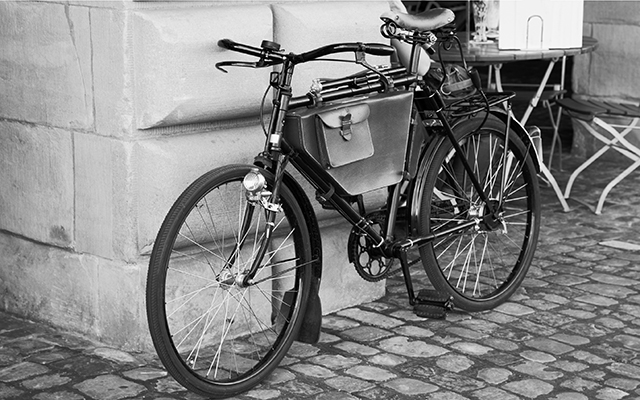One summer evening during my teenage years, my Uncle Arnie and Aunt Dorothy created quite a stir in the neighborhood by rolling down Sunnyside Road on a pair of shiny new bicycles. Heads were turned. Eyebrows were raised. The prevailing opinion seemed to be that old people shouldn’t be acting like schoolchildren. They were in their 40s.
To mark my 65th birthday last week, My Lovely Wife and I climbed on our bikes and pedaled six or so miles northeast to our favorite bookstore, stopping for lunch at a busy riverfront cafe along the way. From the bookstore, we rolled over to a nearby brewpub where we quenched our thirst before heading across the river during rush hour and landing at a downtown bistro for a late afternoon snack. A couple of hours later, having navigated through the early-evening traffic downtown, we were relaxing at our favorite neighborhood wine bar and reviewing the day’s activities. It didn’t occur to me until later that not a single person during our extended trek took the slightest notice of the old couple on their two-wheelers.
This is not at all what I thought “growing old” would be like back when Arnie and Dorothy were pedaling past our house that night. Living this long, for one thing, was nothing like guaranteed. The baby boys who shared the maternity ward with me at Swedish Hospital in Minneapolis that late-August morning in 1951 could expect to live about 66 years. Making it to the magic retirement age of 65 back then was a bit of a long shot. My dad came up five years short, though he outlived a few of his brothers. And now here I am.
And to imagine otherwise today would be seen as pessimistic, even unhealthy — 60 is the new 40, and all that. In fact, a recent study from University College London suggests that “feeling” younger than you really are may help you live longer.
Researchers asked more than 6,000 men and women with an average age of 65 how old they felt and followed up eight years later to find that 86 percent of the youthful-feeling respondents were still kicking, while only 75 percent of those who felt older had survived.
Here’s how researchers explained the correlation:
“We found that self-perceived age predicted all-cause and cardiovascular mortality during the following eight years. Although baseline health, physical disability, and health behavior accounted for some of the association, after adjusting for all covariates, there remained a 41 percent greater mortality hazard in people who felt older than their actual age compared with those who felt younger than their actual age.”
This is not to say we should fall in with either the age-deniers or “super-agers” who have become so popular in recent years. As AARP CEO Jo Ann Jenkins notes in a recent HuffPo piece, geezers simply need to “own” their age and make the best of it. “If you’ve got another 35 to 40 years, how can you make them all you want them to be, and what do you need to do to make it a reality?” she writes.
For this suddenly senior citizen, who really has no idea what 65 is supposed to feel like (much less how to “own” it), reaching this milestone means simply that some mixture of dumb luck and moderately healthy habits have combined to keep me vertical to this point. There are other ways of looking at this, I suppose, and strategies that I could employ to ramp up the quality of my remaining years, but that’s not what’s been on my mind this week.
I’ve been stuck on that image of Arnie and Dorothy pedaling up the street on that long-ago summer evening. It occurred to me that they each lived into their 80s, which seems to suggest (I can cite no research) that I might want to keep my bicycle in good repair.

This Post Has 0 Comments